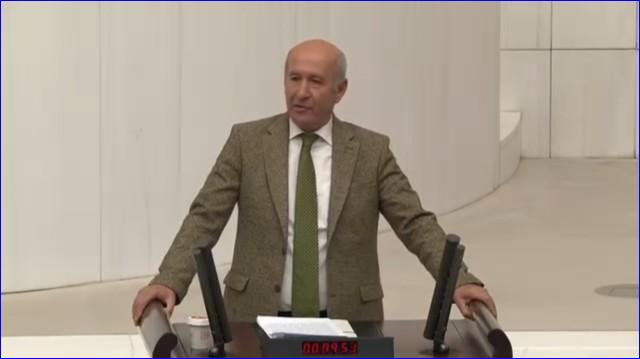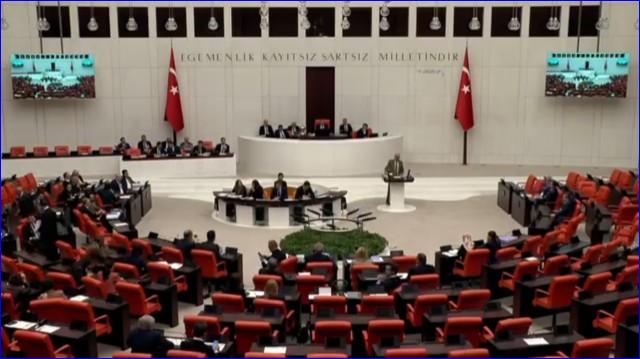


 TBMM)
TBMM)
Aslan drew a wide historical arc to turn to the situation of Christians today, whose numbers are steadily declining because of wars and conflicts in the region. Aslan stated in his opening,
Although the Middle East is more identified with its Arab and Islamic identity and culture today, it is a geography that has hosted many different religions, beliefs and civilizations throughout the history. It is the region where deep-rooted civilizations such as Sumer, Akkad, Babylon, Assyria and Egypt, which have a history dating back to thousands of years before Christ. Christianity, Islam and Judaism were born here...while Christianity was dominant in the region from the 1st until the 7th century, Christian and Jewish communities continued their existence in a wide geography from the Eastern Mediterranean to Yemen, but after the 7th century, and with the spread of Islam, Christians and Jews tried to continue their existence in small communities.
He further pointed to the fact that there are important religious centers in Turkey, Iraq, Syria, and Lebanon, which are considered sacred for Christianity all over the world.
Related: Timeline of ISIS in Iraq
Related: Attacks on Assyrians in Syria By ISIS and Other Muslim Groups
"Until the last century, there was large Christian population in these countries consisting of Greeks, Armenians, Assyrians, Maronites and other different groups. However with the rise of religious extremism in the Middle East, particularly in the last twenty-five years, the armed and bomb attacks of terrorist organizations against churches and Christians, the discriminatory language and practices of governments, the Middle East has become a place where it is impossible for Christian people to breathe."
Aslan touched also upon the demographic decline of the Christian population in Lebanon in context of the civil war that lasted 15 years and referred to extreme challenges and some catastrophs that impacted the demographic situation of the Christians and Yezidis in Iraq after the fall of Saddam Hussein followed by ISIS attacks.
Turning to the situation in Syria, the MP emphasized that since the beginning of the civil war in Syria in 2011, the Christian population, like all other peoples in the country, has suffered greatly. In terms of population size and loss, "it would not be an exaggeration to say that Christians have suffered the most," he added. The "reason for proportionately high losses has been both their faith and their defenselessness situation compared to other groups in the country."

"Since the beginning of the civil war in 2011, countless terrorist attacks have been carried out by ISIS and similar jihadist groups against Armenians and Assyrians living in Syria. In February 2015 [for instance], ISIS carried out a barbaric terrorist attack on dozens of Assyrian villages on the banks of the Khabur River in the Al-Hasakah [governorate] and occupied many villages. As a result of these attacks, many people were killed [and obducted] while thousands of people were forced to leave their homes. In April 2003 [already], the Greek Orthodox Metropolitan of Aleppo, Paulus Yazici, and the Syriac Orthodox Metropolitan of Aleppo, Yuhanna Ibrahim, were kidnapped, and although nearly ten years have passed, their fates are still unknown."
Aslan referred to the dramatic decline of the Christian population in Syria, who prior to the conflict in the country numbered about 10% of the population. Their numbers dropped to a fraction of that. "our people have almost reached the brink of extinction in a country whose name it bears."
Based on the recentt news from the communities, Aslan informed the Parlament that following the the recent developments in Syria, and with the collapse of the Assad regime, Christians, like the Alawites, Druze and people of different faiths, are also in a state of anxiety and uncertainty.
"Although the Christian communities met with new leaders and and were reassured, we can say that their concern is not unfounded when we consider the HTS's jihadist past and its practices in the field as soon as it took over the administration. The HTS administration stated that they wanted to govern the country with Sharia law. This understanding means disaster for women, Alewis, Christians, Druze and the entire country. There is no need to explain what Sharia law means."
According to Mr Aslan the developments described are evidence that "the only way out of this chaotic situation is to implement a governance approach that will build on freedom, equality, democracy and coexistence for all different peoples, religions and beliefs."
Aslan called upon Turkey to exert pressure and spend efforts to steer the interim government established in Damascus to a reasonable approach, "otherwise it will be inevitable for all the people of the region to face new massacres and new pain."
With reference to the trip of the head of the Turkish National Intelligence Service (MIT) Ibrahim Kalin to the Syrian capital Damascus to meet with the HTS leader Abu Muhammad al-Julani, Aslan pointed out that Mr. Kalin prayed at the Umayyad Mosque, which was previously the Mor Yuhanon Church [Johannes the Baptist].
"I would like to draw your attention to the fact that this was a church converted into a mosque. Turkey should of course meet with the Syrian Interim Government officials, but it is not a good image for the Head of MIT to go and pray in a mosque in this context. I am not against praying, but the Head of MIT goes there as representative of the state. The state has no religion, the state is secular. While beeing there, he could have gone to the Bab Touma district - a ten-minute drive from the Umayyad Mosque - and visit the Patriarch of the Syriac Orthodox, the Patriarch of the Greek Orthodox, the Armenian Metropolitan and the Alewi institutions...not just one segment, but representatives of all the peoples and all religious minorities in the country should be met with; their demands should be taken into consideration and efforts should be made to ensure that their rights are constitutionally guaranteed. This will be for the benefit of Turkey as well as Syria. We hope and pray that the incoming administration will be no less beneficial for the people of Syria than the one that left."
Aslan closed his speech by extending his best wishes for Christmas and the New Year for the Christian world in general and for the Armenian, Assyrian and Greek people living in Turkey in particular. He also did not miss the opportunity to wish a happy New Year to all members of Parliament.

or register to post a comment.